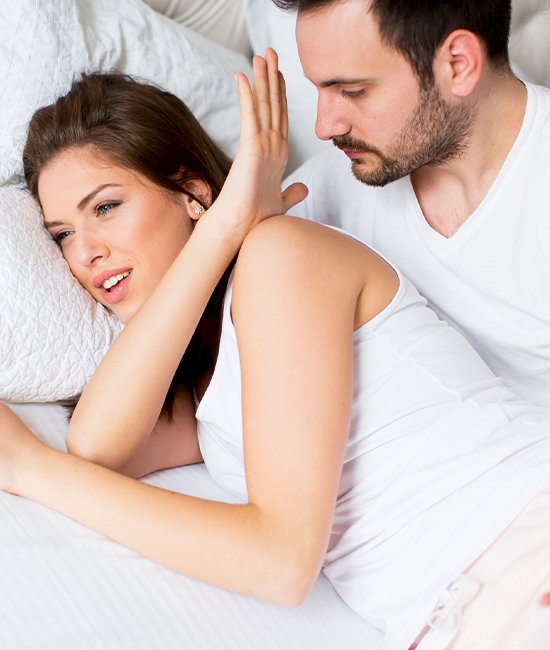Sexual Anorexia
 Sexual reluctance is one of the most common sexual dysfunctions that can occur in both men and women.
Sexual reluctance is one of the most common sexual dysfunctions that can occur in both men and women.
There may be many reasons for sexual reluctance:
Physiological Causes:
- Hormonal imbalances: Decreases in estrogen and testosterone levels, especially during periods of hormonal change such as menopause and andropause, can lead to sexual reluctance.
- Chronic diseases: Chronic diseases such as diabetes, heart disease, cancer, arthritis and obesity can also contribute to sexual reluctance.
- Side effects of medications: Side effects of certain medications, such as antidepressants, antihypertensives and antihistamines (allergy medications) can also cause sexual aversion.
- Alcohol and drug abuse: Alcohol and drug use can suppress sexual desire by affecting the central nervous system.
- Lack of sleep: Insufficient sleep can lead to fatigue and weakness, which can negatively affect sexual desire.
Psychological Causes:
- Stress and anxiety: Difficulty in coping with the stress and anxiety of daily life can cause mental and emotional overwhelm and reduce sexual desire.
- Depression: One of the most common symptoms of depression is sexual reluctance. Depression can lead to sexual reluctance by dulling the ability to feel happiness and pleasure.
- Traumatic sexual experiences: Past experiences such as sexual abuse, harassment or trauma can negatively affect sexual desire and arousal.
Sexual Causes
- Inadequate foreplay: Insufficient stimulation can lead to sexual aversion and vaginal dryness.
- Sexual dysfunction: Sexual dysfunctions such as erectile dysfunction, premature ejaculation and vaginismus can also lead to sexual reluctance.
- Inappropriate positions during sexual experience: Some positions can cause more pain or discomfort than others, which can negatively affect sexual desire.
- Rough behavior: Rough and rude behavior during sexual experience can lead to pain and injury, which can reduce sexual desire.
- Sexual monotony: Having sexual experiences with the same ruitin and the same positions can reduce excitement and interest over time.
In case of sexual reluctance, it is absolutely necessary to go to a gynecologist/urologist or psychiatric examination. After your physician makes the diagnosis; depending on the underlying cause, there will be recommendations such as medication, psychotherapy, sexual therapy or lifestyle changes.
What you can do to prevent sexual reluctance:
- Manage your stress: Practice stress-reducing techniques such as yoga, meditation or breathing exercises.
- Get enough sleep: For adults, 7-8 hours of sleep each night is ideal.
- Eat a healthy diet: A balanced and nutritious diet can boost your overall health and energy, which can have a positive impact on your sex drive.
- Exercise regularly: At least 150 minutes of moderate-paced exercise a week improves blood circulation and hormonal balance, which increases sexual desire.
- Avoid alcohol and drugs!!!!! Alcohol and drugs have a negative effect on your sexual desire.
Pain During Sexual Intercourse (Dyspareunia)
Pain during intercourse is called dyspareunia and is characterized by symptoms such as burning, stinging, tingling, sharp pain or discomfort in the vagina, vulva, clitoris or lower abdomen. Usually the pain is felt during penetration of the penis into the vagina or during intercourse.
Dyspareunia is a common problem that can significantly affect women's sex lives.
Factors Causing Dyspareunia:
Dyspareunia can be caused by psychological, physical or a combination of both.
- Psychological causes:
- Relationship problems
- Stress
- Anxiety
- Depression
- Having experienced sexual trauma in the past
- Low self-esteem
- Physical causes:
- Stenosis of the hymen or vaginal opening
- Vaginal dryness (especially common during lactation and menopause)
- Infections (vaginitis, vulvitis, pelvic inflammatory disease)
- Endometriosis
- Vaginismus
- Pelvic pain syndromes
- Fibroids located in the uterus
- Ovarian Cysts
- Stitches made during childbirth do not heal well
- Vulvodini
If you experience pain during sexual intercourse and this complaint recurs with each intercourse, a detailed gynecological examination is essential. Your doctor will review and evaluate your medical history and findings. He or she may also order tests to rule out infections or other medical conditions.
Dyspareunia Treatment:
The treatment of dyspareunia will vary depending on the underlying cause.
Treatment options are as follows:
Vaginal lubricant or moisturizing cream or ovules for vaginal dryness
- If infection is detected; Antibiotics or antifungal (fungal) drugs
- Hormone Therapy (containing estrogen) for Endometriosis or Menopause
- Painkillers
- Physical therapy to relax spasm of the pelvic floor muscles
- For psychological causes such as stress, anxiety or depression; Psychotherapy